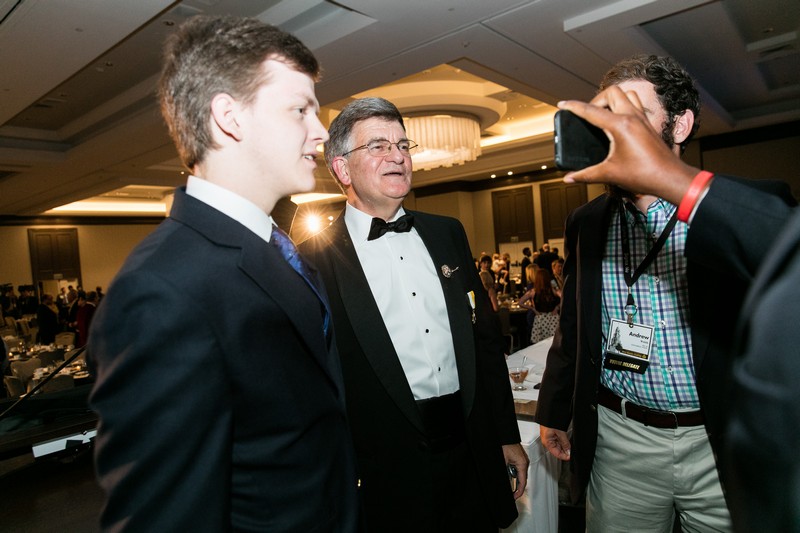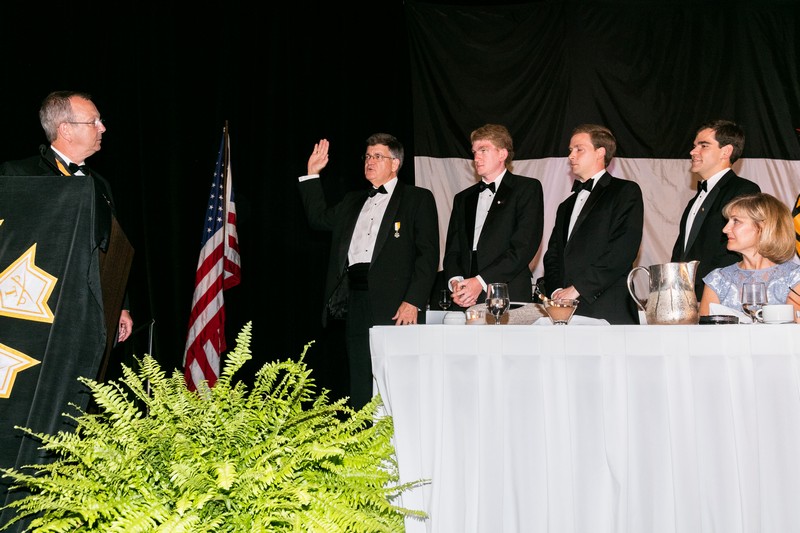Features
Your inauguration speech in San Diego referenced a walk you took with some fellow volunteers during the 2007 College of Chapters in Lexington. What has been the significance of this walk in setting the course of the fraternity since then?
Those conversations that we had during what we all have named the “Long Walk” have had a significant influence on the course the fraternity has been on for the last several bienniums. One of the thoughts that we all had was that it is very difficult, if not impossible to have a strong national fraternity, unless you have strong individual chapters – all across the country. Conversely, a preponderance of average or below par local chapters will lead to an average national organization, and we felt that that we could do better as a national organization if we focused on the local chapters.
So, starting several bienniums ago, we started talking regularly and often about excellence and chapter strength and putting the appropriate resources and attention behind specific initiatives. Several tools were developed and key initiatives were begun and have continued since that time, as well as new ones that have been started which strive keep the chapters focused on persistent, year round operational excellence.
On the scholastic side, we are very proud of the fact that for the school year ending 2015, our collective chapter average grade point was a 3.0 -- for the first time ever. We strive to continue to focus in these areas of chapter strength, scholastics, and leadership training, and our excellent national staff has been key in working with each local chapter to focus on these areas. The Long Walk was the genesis for putting these initiatives in place, and they’ve been successful and we want to build and continue on that path of success.

How would you describe the theme the High Council will pursue this biennium?
A general theme that I’ve spoken of is: “Linked to our Past – Committed to our Future.” That theme also includes the lifetime commitment to the fraternity that each of us has. This acknowledges our long history of success that we should be proud of, while at the same time dedicating and committing ourselves to maintaining and building on the success which was created by those who went before us.
I like to think of our fraternity as one long continuing chain that started that night in the fall of 1868 just off the Parade Ground at VMI when our founders first established our Fraternity, and which has continued without interruption for over 148 years. Each and every one of us is a distinctive link in that chain –we each have unique chapter and badge number -- and we are all individually linked back to our three founders. We have gone from a three-link chain to a 235,000-link chain. I want us to continue on the strong path that has been set over the last few bienniums, to keep on the path that we’ve set, and enhance and build on the successes we’ve achieved.
Your speech in San Diego mentioned an opportunity for increased alumni engagement. What would that look like for Sigma Nu?
Yes, as I mentioned, when you join Sigma Nu it is a lifetime commitment -- and as we all know, that is one of the oaths that we take when we are initiated. Initially, when you are in college the fraternity has a commitment to you to provide certain benefits, programs and tools that will help you develop as an ethical leader. Then, after graduation you are committed to the Fraternity – for life. That commitment may take many forms, including time, volunteering, advice and counsel to undergraduates, donations at the national and/or local level, serving on a chapter advisory board, city or chapter alumni organizations and a host of other things you can do as an individual. Everyone – each and every Sigma Nu – has something to contribute, and that they can give back. I mentioned in my remarks that although we don’t have quite a ‘cradle to grave’ approach, you could say that we do indeed have an ‘initiation to grave’ commitment, which means that you are a Sigma Nu from the time you are initiated until you enter the Chapter Eternal.
Interestingly over the years, I have heard many Sigma Nus who attribute their successes in life to their fraternity experience, and the value they have received from the fraternity. I can certainly say this, and I know many who read this will also attest to that, and it is a life-changing experience. We need to do a better job of getting that word out, and to continue to emphasize the value of lifetime membership.
We currently have over 175,000 living alumni, and there is an opportunity for each and every one of us to give back in some way. There are many alums would like to get involved, but don’t know how. We’ve got lots of opportunities, and we’d love to hear from you.

You’ve met a lot of collegiate chapter officers during your tenure with the High Council. What are the leadership traits excellent chapter officers have in common?
There are quite a few, but some of the key ones that I’d mention include the following:
Listening and communication. You have to be an active listener, and to genuinely hear what the other person is saying and understand where they’re coming from. Don’t be thinking of your answer while they’re speaking – actively listen intently, and then respond. You need to be able to communicate with them effectively. You have to learn how to put yourself in the other person’s shoes and see their point of view and be empathetic.
Excellent decision making skills. You have to carefully think things through and make the right decisions. Quality decisions are dependent on a number of factors, including what the intended consequences are, as well as and sometimes more importantly, the unintended consequences. Decision making is a key life skill, and you’ll get plenty of practice as a chapter officer. Sometimes you have to make those on your own and at other times you’ll be able to involve others in the decision. You have to look at the issue from all sides and be able to make the best decision with all of the facts available to you. Our Regent-Elect John Hearn has a great saying that we often quote: Good leaders need to be able to choose the harder ‘right’ over the easier ‘wrong.’
Courage. As a chapter officer you’re going to be in some uncomfortable situations – that comes with the territory -- and you have to be able to stand your ground and do the right thing. At times, you may have to make unpopular decisions, and you will need the courage to do so. And, knowing that going in if you do the right thing, and you have the courage of your convictions, things will usually turn out for the best in the long run. You also have a lot of support groups you can tap if needed, including other officers, alumni, the national organization, university administrators, etc.
Selflessness. You have to put the welfare of the chapter and your brothers ahead of yourself. You are a leader and you were elected to lead. If you’re the Commander, you are the captain of the ship, and you have to be in charge. At times, you may not be able to do what everyone else in the chapter is doing – which may mean missing out on some things. You are the one everyone is going to look up to, and you’re the authority in that chapter – the Commander is the person in the chapter everyone will turn to, whether they are brothers, alumni, parents, university officials, or the General Fraternity staff – you are the leader of your chapter. It is a large responsibility for a young man in college to have, but it will shape you and make you a better person and give you valuable life skills, opportunities and leadership skills that most of your peers will not have.
Thick Skinned. A chapter commander told me a few years ago that if someone in the chapter wasn’t mad at you at some point during the semester, you probably weren’t doing your job. You are going to have to say ‘No’ a lot –and you’re going to have to be the bad guy at times. You can’t take it personally – you have to let things roll off your back.
Have confidence in yourself and others. As an officer, you were elected by the chapter to do a specific job, and the chapter has the confidence in you to do so. Don’t underestimate yourself and be confident in your abilities, but don’t be afraid to ask for help or assistance. You have lots of resources available, so don’t be shy about using them and involving others if needed.

What advice would you offer to a collegiate officer with hopes of transforming a struggling chapter? Where does he begin?
First off, do not try and do everything by yourself. Don’t be afraid to ask for assistance. There are lots of resources available to you, including those in your chapter such as other officers or recent past officers who may have graduated. You also have alumni, your university, parents, your Sigma Nu consultant or others on the national staff, and possibly other nearby chapters or people you may have met at Sigma Nu events such as College of Chapters, Sigma Nu institutes and Grand Chapter.
There is no excuse for struggling and failing if you do not ask for assistance. We would rather have a chapter ask for help early, rather than wait until things are in dire straits or before things get to the critical stage. No one has all the answers, and there are plenty of people who are ready and willing to help.
Secondly, you need to properly assess the situation by determining what is exactly wrong and why. If you need help with this assessment, get it. You can also look at your Pursuit of Excellence or chapter consultant report and recommendations to see where you need to make improvements. You need to then determine the areas you need to tackle first that you can have the most impact on. What are the ‘basics’ and where can you make the most gains the quickest? Is it recruiting new members, finances, scholastics, reputation, etc.? Then enlist others who have your vision and together develop the steps and plans on how you want to get there, divide up the tasks, delegate them and come up with timelines for accomplishing them, and then hold each other accountable. Accomplish big goals by setting smaller tasks to complete which in turn will go towards achieving the larger goal.
What about the officer of a Rock Chapter? How does he inspire his chapter to avoid complacency?
Complacency by definition is a feeling of smug or uncritical satisfaction with oneself or one’s achievements. It is the natural enemy of sustained success and it human nature to relax and ease up after you have accomplished a difficult goal or objective and reached a sought after goal. That’s true in sports teams and individual athletics, academics, business and a number of areas. In his book Good to Great, the author Jim Collins said “Good is the enemy of Great.”
The officers of Rock Chapters have to continually find ways to motivate and keep the chapter focused on sustained excellence. You have to re-focus, set new goals and keep your eye on the ball – it is often harder to stay on top and repeat than it was to get there in the first place. You need to get the younger guys in the chapter enrolled, excited and motivated about keeping the Rock Chapter, and the older, seasoned guys motivated as well – perhaps as mentors to the younger guys on keeping that Rock Chapter after they graduate. You have to have milestones, measurements and monitor and keep track of your progress. You cannot wait until the end of the semester to catch up – it has to be an area of focus week to week and month to month. And, as you monitor progress, if you find that you are going off track, a course correction needs to be quickly made. Another thing I’d recommend is that a new Rock Chapter should get to know some of the repeat Rock Chapter winners and ask them for their suggestions and advice on how they are able to be repeat winners. It is not luck – it is due to hard work and diligence.

What are the most critical issues facing higher education right now? How can fraternities be the driving force behind solving these problems?
There are many, but I’ll mention a few that are top of mind.
Costs: tuition, financial aid and the cost vs. value equation. Universities are under pressure to demonstrate the value proposition for what they are offering. As a college education becomes more expensive and parents and students look at the value they are getting for the cost, I believe fraternities offer a unique opportunity to add to the value part of the equation. We offer outstanding leadership, training, mentoring and other life skills that other parts of the university do not offer that lead to student success. These living and learning experiences and skills which the fraternity gives will translate into a better, more well-rounded graduate better prepared for life and more attractive to employers than their non-Greek peers. Statistics also show that fraternity members have a higher percentage of graduation than non-Greeks.
Behavioral issues, including alcohol/substance abuse and campus safety. These issues continue to be a concern in higher education, and fraternities can take the lead in continuing to educate and develop its members in how to conduct themselves as good citizens and gentlemen.
Sigma Nu has taken the lead in several of these areas. Over 93% of our collegiate members have participated in the educational program GreekLifeEdu, which educates collegians on alcohol and substance use and abuse, and we are a founder of the Alcohol Prevention Coalition. We also co-founded the Social/Bystander Strengths workshop with Zeta Tau Alpha, which addresses sexual misconduct awareness and prevention.
We have a comprehensive anti-hazing program, including our sponsorship of hazingprevention.org, National Hazing Prevention Week, Novak Institute for Hazing Prevention, and have developed and implemented a national anti-hazing campaign for six years.
What must fraternities do to stay relevant in the next 3-5 years and beyond?
Fraternities are more relevant now than they have ever been. Our mission is one that no one can argue with – developing ethical leaders. Society needs ethical leaders more now than ever. We need to continue to offer a valuable experience to young men, develop them, give them valuable life skills and instruct them as to how to be gentlemen and better members of society. I believe if our chapters are doing things the right way – and most are -- we offer something that they cannot get anywhere else on campus. We are marketing this value proposition to parents, administrators and potential new members – and in my opinion, the fraternity experience – if done right – provides real world, maturing experiences they’ll need later that will make them more successful down the road. These include living, working with and getting along with others in a self-governing environment, communications and problem solving and leadership skills.
Leadership skills and ethical behavior as well as being a gentleman will always be valuable for a person to have, and if we can continue to grow and develop ethical leaders, that is a powerful value proposition to be able to offer.
Fraternities have been active on campuses in the U.S. for over 240 years, and many of the strongest leaders in all walks of life have come from the fraternity community. What fraternities offer in the way of leadership development has been invaluable, and it needs to continue to do so. Fraternities need to evolve and change to a degree, but also keep focused on their values, creed, liturgy and the things that have kept fraternities thriving for two and a half centuries.
At many, if not most universities the most active alums, donors, foundation leaders, fund raisers, and alumni chapter club officers, are fraternity members. And, even though Greeks on campus comprise a small percentage of the student body (usually 25% or less), at many universities they make up a very sizeable percentage the alumni donors and alumni leadership positions of that school. The new NIC will be working to set up more local Alumni IFC organizations who will be work directly with their chapters and the university administration in order to enhance the relationships between the universities and the fraternity community and continue that natural pipeline of alumni leaders for the university’s alumni and foundation organizations.